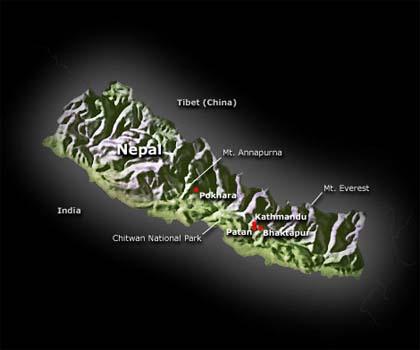Nepal to tell its story on 10th anniversary of IA hijack
 Kathmandu, Dec 23 - A decade after the stunning hijack of an Indian Airlines (IA) aircraft on way to New Delhi from Kathmandu and the brutal killing of a passenger by terrorists, Nepal, whose economy was devastated by the incident, is ready to narrate its own version of the disaster.
Kathmandu, Dec 23 - A decade after the stunning hijack of an Indian Airlines (IA) aircraft on way to New Delhi from Kathmandu and the brutal killing of a passenger by terrorists, Nepal, whose economy was devastated by the incident, is ready to narrate its own version of the disaster.
From early 2010, Nepali film director Dayaram Dahal is planning to shoot the first Nepali film on the mid-sky drama that occurred Dec 24, 1999 as five Pakistani terrorists associated with the militant organisation, the Harkat-ul-Mujahideen, hijacked the IC-814 flight shortly after it took off from the Tribhuvan International Airport in Kathmandu and entered Indian air space.
"I was in Nagarkot (a scenic tourist resort 32 km east of Kathmandu) at that time shooting for my film 'Dhugdhugi'," says Dahal, whose recent release "Kaha Chho Kaha" is also a tale of India and Nepal, focusing on trafficking of Nepali women in the subcontinent's brothels.
"I remember a honeymooning couple from India who stayed at the same hotel. They had been married for just a week. I didn't know their names at that time. But I do now after the hotel manager told me the husband was the one to get killed during the hijack."
Rupin Katyal, a 25-year-old electronic engineer from Chandigarh and his wife Rachna, had gone to Nepal to spend their honeymoon there. On the way back, Rupin was stabbed to death by the hijackers.
"I was stunned," says Dahal. "I could not forget the tragic fate of the young woman who was widowed within a week of her wedding. I was also shocked at how another innocent Nepali passenger, who was as much a victim as the others, was falsely accused of being in cahoots with the hijackers and suffered the loss of reputation long after the hijack ended."
Gajendra Tamrakar, a Nepali character artiste, was among the 178 passengers on the aircraft that was finally taken to Kandahar in Afghanistan. A section of the media reported him to be one of the accomplices though an inquiry later absolved him, saying of the four aides arrested, two were from Pakistan, one from India and the lone man from Nepal was Yusuf Nepali.
"The humiliation and suffering of a fellow artiste remained in my mind," says Dahal. "I thought I should make a film that would project Nepal's version of the tragedy as well since Nepal suffered terribly after the hijack with tourism, the mainstay of the economy, collapsing."
His film starts with the widow returning to India, but not alone. She is pregnant and her fatherless son grows up to be an aggressive young man angered by his father's killing.
Mother and son decide to retrace their steps to Nepal and as fate would have it, on their way back, the aircraft is hijacked once again, creating a twist in the tale.
Dahal is awaiting permission from the Afghanistan government to shoot in Kandahar. He also plans to make part of the film in Amritsar in India, where the hijacked aircraft had to land for refuelling.
"It will be difficult to base the film on harsh reality but unless I do so, there's no point in making it," says the 38-year-old.
Despite the grave impact on Nepal, the IC-814 incident had remained untouched by Nepali writers and directors till now.
In India, on the other hand, Bollywood has made two films based on the incident, "Zameen" and "Hijack", while Haryana's Miditech company made a documentary, "Air Hijack", that was aired by National Geographic.
An Indian journalist, Neelesh Mishra, also wrote a book on the hijack: "173 hours in captivity: the hijacking of IC 814". (IANS)